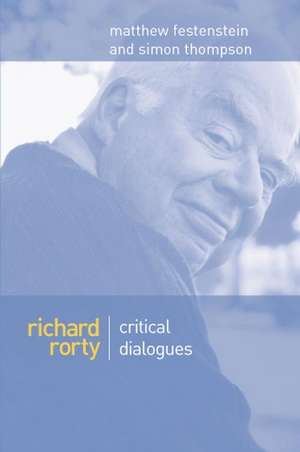Richard Rorty: Critical Dialogues
Autor Festensteinen Limba Engleză Hardback – 17 oct 2001
Topics explored include anti-foundationalism; irony and commitment; justice; liberalism and utopianism; reason and aesthetics; humanism and anti-humanism; the Holocaust; the theory of international relations; social democracy and the pragmatist tradition. Each essay is followed by a reply written for this volume by Rorty. The volume also includes a substantial essay by Rorty on 'Justice as a Larger Loyalty'.
This volume is indispensable for any reader interested in Rorty's work, or in contemporary debates in social, political or ethical theory. Contributors: Molly Cochran; Daniel Conway; Matthew Festenstein; Norman Geras; John Horton; David Owen; Richard Rorty; Kate Soper; Simon Thompson.
Preț: 355.26 lei
Preț vechi: 508.34 lei
-30% Nou
Puncte Express: 533
Preț estimativ în valută:
67.98€ • 71.17$ • 56.25£
67.98€ • 71.17$ • 56.25£
Carte indisponibilă temporar
Doresc să fiu notificat când acest titlu va fi disponibil:
Se trimite...
Preluare comenzi: 021 569.72.76
Specificații
ISBN-13: 9780745621654
ISBN-10: 0745621651
Pagini: 256
Dimensiuni: 161 x 236 x 24 mm
Greutate: 0.47 kg
Editura: Polity Press
Locul publicării:Chichester, United Kingdom
ISBN-10: 0745621651
Pagini: 256
Dimensiuni: 161 x 236 x 24 mm
Greutate: 0.47 kg
Editura: Polity Press
Locul publicării:Chichester, United Kingdom
Public țintă
2 nd year Undergraduates and postgraduates studying philosophy and social and political theory.Notă biografică
Descriere
Richard Rorty is one of the most influential and provocative figures in contemporary intellectual life. He argues that many of philosophya s traditional concerns are redundant, and that the goal of inquiry should not be truth but human betterment.
